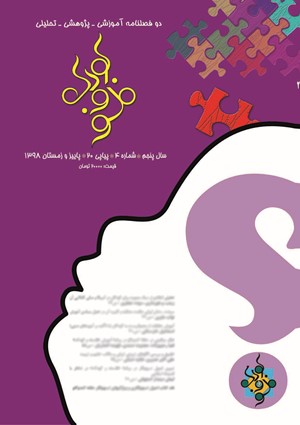کودک و دنیای فلسفی او
محورهای موضوعی : «تعلیم و تربیت» و «فلسفه و کودک»
مسلم شجاعی
1
![]() ,
سید سجاد ساداتی زاده
2
,
سید سجاد ساداتی زاده
2
![]()
1 - دانشگاه آزاد اسلامي
2 - اهواز
کلید واژه: فلسفه کودک آموزش,
چکیده مقاله :
مهمترین رکن آموزش، ایجاد راهکاری برای تفکر و پویایی طالبان آن است. از اینرو نیاز به علمی که تفکر و اندیشیدن بر پایۀ استدلال را بیاموزد، احساس میشود و این یعنی باز شدن راه فلسفه به آموزش در تمامی سطوح، بویژه دوران کودکی. از آنجایی که اهمیت علوم به کاربردی بودن آنهاست، ما در این پژوهش درصدد تبیین یک چارچوب نظری برای درک کاربردی بودن و ارتباط فلسفه با نظام آموزش و کودکان هستیم تا کارکرد و نقش فلسفه برای سامان دادن به نظام پرسشگر کودکان را دریابیم و نهایتاً به هدف مدنظر منتهی شود. در صورتی که فضا، آموزش و برخورد مناسب با کودک رعایت شود، بدلیل بروز تفکر فلسفی و بالقوه فیلسوف بودن کودک، میتوان از او یک فرد مستعد، کارآمد و خلاق در حوزههای مختلف ساخت.
The most important task of teaching is to work out a program for triggering thinking among students and bringing about dynamism among them. To this end, it is necessary to develop a science that can teach children the way of thinking on the basis of reasoning for which philosophy should be involved in all levels of teaching particularly in childhood. Since the importance of sciences depends on their applicability, in this research we try to develop a theoretical framework for understanding the functional task of philosophy in its relation to the system of teaching and children. In this way, we can understand the role of philosophy in answering the questions raised by children. If the teaching atmosphere is prepared for children, then drawing on their philosophical capability, they will presumably turn out to be creative, talented and efficient in various field of society.
اسمیت، فیلیپ (1382) ذهنیت فلسفی در مدیریت آموزشی، ترجمۀ محمدرضا بهرنگی، تهران: کمال تربیت.
رشتچی، ﻣﮋﮔﺎن (1389) «ﺑﺮرﺳﯽ ﻧﻈﺮﯾﮥ وﯾﮕﻮﺗﺴﮑﯽ از دﯾﺪﮔﺎه روانﺷﻨﺎﺳﯽ و ارﺗﺒﺎط آن ﺑﺎ ﻣﺒﺎﻧﯽ ﻧﻈﺮي آﻣﻮزش ﻓﻠﺴﻔﻪ ﺑﻪ ﮐﻮدﮐﺎن»، ﺗﻔﮑﺮ و ﮐﻮدك، ﺳﺎل اول، ﺷﻤﺎرة اول، ص20ـ3.
رمضانی، معصومه (1389) «بررسي برنامة درس فلسفه براي كودكان در راستاي توجه به ابعاد مختلف ذهنيت فلسفي»، تفکر و کودك، سال اول، شمارة اول، ص35ـ21.
ساداتیزاده، سیدسجاد؛ امانی، میثم (1398) کلیات فلسفه، اهواز: آیات.
قاسمي، فرشيد؛ زارع، زهرا؛ حقيقت، شهربانو (1390) «مقایسة تأثیر داستانهای فلسفی ایرانی، غیرایرانی و داستانهای عادی بر رشد تفکر فلسفی کودکان پایة اول ابتدایی»، رهيافتي نو در مديريت آموزشي، دانشگاه آزاد اسلامي واحد مرودشت، شمارة 8، ص152ـ133.
کریمی، عبدالعظیم (۱۳۷۶) «تفکر شهودی در کودکان و ضرورت بازگشت به کودکی»، پژوهشنامه ادبیات کودک و نوجوان، شمارة ۱۰، ص26ـ7.
Fisher R. (2001). Philosophy in Primary Schools: fostering thinking skills and literacy. Reading. Pp.67-73 Brunel University. Khosrownejad, M. (2007). A contemplation on the Association of the Literature of Children and Philosophy, regarding the Philosophical programs for Children. Journal of Educational Innovations. No. 20, pp.109-124.
Lim. (1998). Philosophy for Children (or thinking together). stu mentor magazine, nov/des 2003/19/11 p.12.
Marashi, M. (2006). The Effects of Society Research on Educating the Argumentative Skills of Male third Graders of Junior High Schools in Ahwaz city. Presented in a national congress on humanities.
Daniel, M. F. (1996). p4c in pre service Teacher Education. Analytic Teaching, vol. 19. No. 1, pp.15-28. Matthews, G. )1994(. The Philosophy of Childhood. Cambridge: Harward University Press.
Murris, K. (2013). The epistemic challenge of hearing child’s voice. Studies in Philosophy and Education, vol.32, pp.245–259.
Safaeimoghadam. M. (1998). Teaching Philosophy for Children, Human Sciences. Journal of Alzahra University, vol. 8, No. 26-27. pp.161-184.
Sharp, A. M. (1993). The community of inquiry: Education for democracy. ed. M. Lipman. Thinking, children and education, pp. 337–346. Dubuque, IA: Kendall/Hunt Publishing.
Siegmund, M. (2019). Philosophy for Children and Teenagers, The best 123 questions, )Including Many Pictures that will Encourage the Joint Thinking Process(. Norderstedt: Books on Demand.
Splitter, L. & Sharp A. M. (1995). Teaching for Better Thinking: the Classroom Community of Inquiry. Melbourne: ACER.
Topping K. J. and Trickey S. (2007) Collaborative Philosophical Inquiry for School Children. British Journal of Educational Psychology. vol.77, No. 4. pp.787-796.


